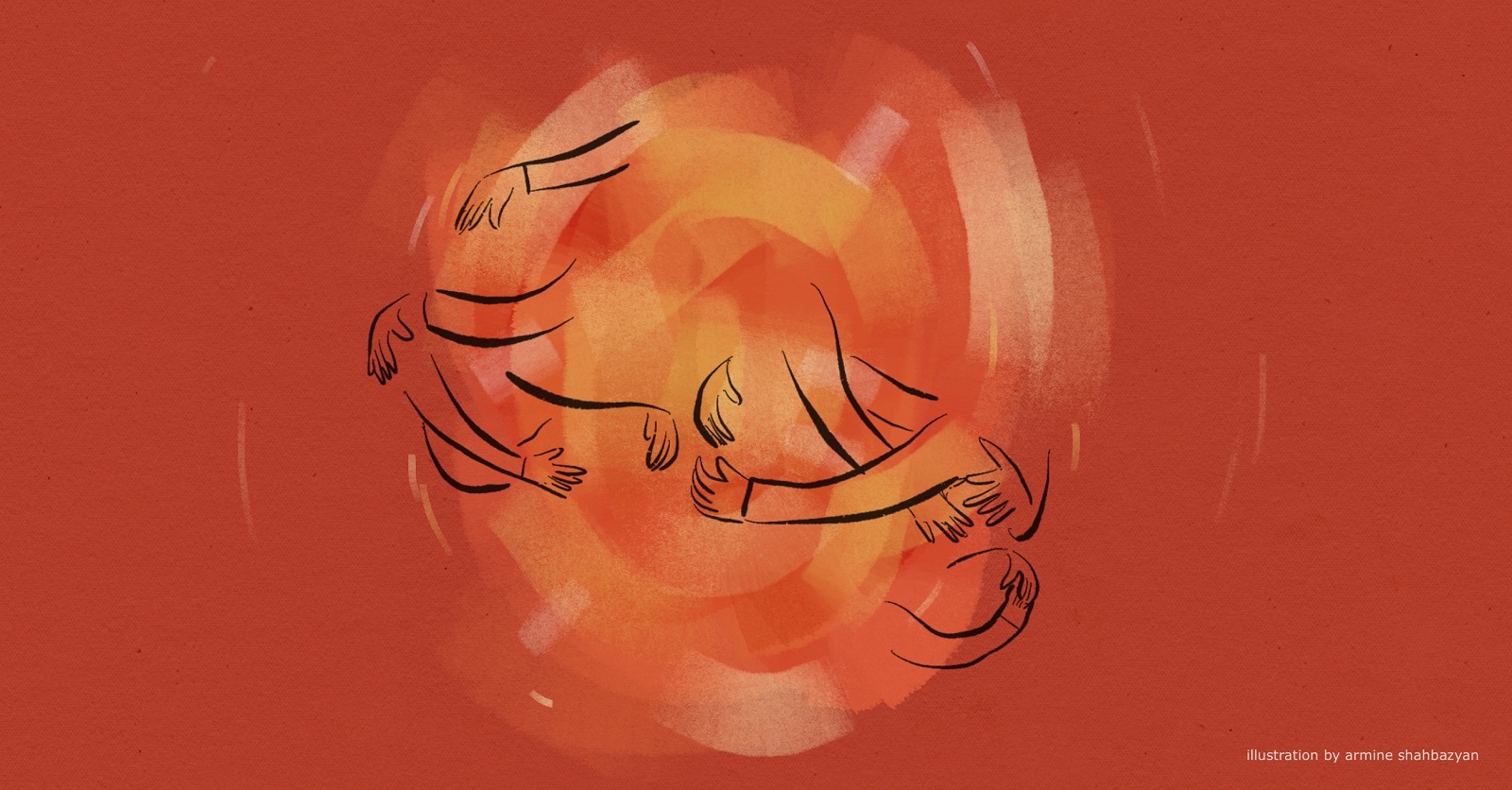

Listen to the article.
When I was around 7 years old, a girl in my class said: “You act so kind like the rich people would.”
Frankly I don’t even remember her name or how she looked, or what I might have done to warrant this comment. Maybe I shared my lunch. I just remember her words, because even as a child I thought it was strange.
Throughout my life I kept hearing various iterations of this same expression: “Kindness is for rich people, we’re poor.”
This message would pop up in very unusual places and times. In my twenties one of my neighbors kept criticizing me for my habit of feeding stray dogs, saying: “There are people that are hungry, why are you feeding these stupid dogs?!”
It sounded slightly like Kourtney Kardashian’s iconic response to her sister Kim mourning her $75,000 diamond earring lost in the ocean: “There are people that are dying.” But in my case it wasn’t an earring, it was just my leftovers. Still, I took the neighbor’s comments to heart and started also feeding the homeless. I simply added one more portion while cooking and left the food outdoors. I thought this is what the neighbor meant — to take care of people too.
This time the neighbor had a new critique: “Dear girl, how do you have all this money?” It finally dawned on me — she simply meant I should not be sharing anything. But to be honest, there were no financial implications in sharing, it was about the simple effort of packing the food with dignity instead of throwing it in the bin. Again, sharing or any similar act of kindness was seen as an attribute of opulence and not just a character trait or a conscious act.
Any other, smaller manifestations of politeness, like greeting people when you enter an elevator or get on a bus or on our old tiny marshrutkas, are also seen as strange. I even recall one old lady explaining to other passengers in Russian, that it’s okay, I was probably a diasporan.
Honestly, I never understood this logic, this thing we do, where we attribute anything normal, polite or cultured to “Westerners”. One of the last times I was reminded of the “we’re too poor to help others” logic was sometime in 2013, when I was preparing educational content for a financial institution. The brochures were going to be distributed in the regions. The aim was to increase financial literacy among the young people. The content had focused on the banking system, the types of loans available and other information that could be useful in rural communities.
They looked through the content I had prepared and had only a few remarks, one of which was regarding the 50/20/30 budget rule.
This rule was popularized by U.S. Senator Elizabeth Warren, who said: “Spend your 50% on needs, 30% on wants, and 20% on savings.” My text included a different variation of this rule suggesting to devote 5% from one’s savings to charity. I thought in small countries like ours small acts like this could actually have an impact.
But what my client told me was to take the charity idea out, because “our society is too poor, people have no money to share with others” and since I was running out of my own money, I took this passage out to just quickly finalize my project and receive my honorarium, which they made clear was too high for just a text. I didn’t care to get involved in ethical discussions that wouldn’t change anything, but again I heard the same message: “It’s nice that you want to encourage personal responsibility in people, but they’re too poor to be responsible.”
There are, however, a few people whom I’ve met, who through their words and actions have challenged the “too poor to share” mindset. One of them is a Russian woman, a photographer and multi-faceted individual Elena Frolova-Trufanyan, who I met during a shoot sometime in 2010. Ironically it was a commercial for a bank. She was the makeup artist and though our collaboration was short, we kept in touch for months. During my first visit to her apartment, she handed me a lovely khaki top, saying she bought it, but it didn’t fit, so if I liked it, it’s mine. I loved how casually she gave away something that was meant for her and looked really beautiful. She was just an ordinary person, living in a rental apartment, hustling to pay bills and make ends meet. Yerevan wasn’t her native town, she didn’t have a family or support here, but somehow, every time we would meet I would learn of some random act of kindness she had casually done as if it was her job. Even now, being a single mother of two, still living in a rental, she keeps sharing stories of people in need, collecting money for them and giving things away.
On the surface it looks like random acts of kindness, but at its core, it is an example of how a person who is not wealthy, a celebrity or particularly well-known, can assume a certain area of responsibility and be influential, changing things on a micro level. In small communities like ours micro steps like this can have a really strong impact.
It might sound odd to say that we Armenians don’t like sharing, because we pride ourselves on being known as “hospitable” and always having “open doors”. But our hospitality and open doors are mostly for the “other”: the foreigners, the guests to our country. If we could learn to share a bit of this generosity with our fellow Armenians, those fleeing war zones, those in rural communities, or in border villages, we could greatly enhance the well-being of all Armenians.
Undoubtedly, our culture of hospitality is deeply ingrained, influenced by the unique geographical position of our country along the Silk Road. For centuries, thousands of merchants, soldiers, migrants, and travelers have passed through, leaving behind a legacy of generosity towards outsiders. This tradition is a testament to the rich layers of history that have shaped our identity.
Our roots offer another lens through which to understand this ethos of generosity. In our pagan past, we revered Vanatour, the god of generosity, whose veneration is marked on August 11 during Navasard. Significantly, this date coincided with the harvest, intertwining acts of sharing with aspirations for abundance and prosperity.
The Hellenistic period also influenced us with its traditions and cultural habits, one of which is Philoxenia, an act of showing hospitality toward strangers or guests common in Ancient Greece. Philoxenia stems from the Greek words “philos” meaning friend or beloved, and “xenos” meaning stranger or guest. It emphasizes the duty or virtue of extending warm and generous hospitality to visitors, reflecting a cultural value deeply ingrained in various societies, particularly in Mediterranean cultures.
Different waves of colonizers over the centuries also made sure this brand of hospitality became a part of our identity just as a reassurance that we’ll serve well.
Setting aside historical explanations and rationalizations, if it’s something so deeply rooted in our identity, maybe we can reformulate, reimagine and adopt a new set of habits that could help elevate others and contribute to a more resilient society. Armenia can embrace a culture of kindness as part of its identity and not only proclaim that it was the first nation to adopt Christianity as a state religion.
There are fascinating cases when acts of kindness transcend mere gestures within a community, becoming compelling narratives that shape outsiders’ perceptions of a country. Here are some relatable examples:
The tradition of caffè sospeso is a century old and began in Naples, Italy. It calls for people who’ve had a good day or feel like doing something nice to order two “suspended” coffees in a coffee bar. You pay for two coffees, drink yours and “donate” the other to a stranger. One can come in and claim the “suspended coffee”. You may not see the person, but knowing you did something nice for another is what it’s all about.
We could use this idea to develop other acts of kindness, for example paying for two pieces of bread, donating one, or even having a specific “kindness” coupon with a small menu and the one in need could use it in any shop or cafe.
Hesed or chesed is the Hebrew word meaning kindness, mercy or compassion, associated with acts of charity, generosity and grace towards others. It involves going beyond the letter of the law to help others, even when not obligated to do so, out of a sense of empathy and moral responsibility. It encourages individuals to perform acts of kindness not out of duty or expectation of reward, but simply because it is the right thing to do.
The Wall of Kindness, originally started in Mashhad, Iran back in 2015, is a public donation space where one can leave something for others, including clothing, food and other basic necessities. If you need something, you can simply pass by and take something from this wall for free.
Kaitiaki is an indigenous Polynesian practice embraced by the Māori people of New Zealand. It embodies the concept of guardianship, extending to the sky, sea, and land. In a significant move reflecting this worldview, the New Zealand government bestowed legal personhood upon the Whanganui River in 2017. This designation means that harming the river incurs penalties akin to harming a human being, reflecting a profound respect for the natural world.
While the Whanganui River case stems from the Māori worldview, its principles of environmental stewardship resonate universally. Armenians, too, could implement such practices, offering a compelling reason to safeguard our land and nature. Despite our fervent toasts to “yerkir” and readiness to defend it, we often overlook the importance of preserving its cleanliness. How can we formulate a comprehensive plan to instill this respect for nature within our society?
We continue to grapple with generational trauma stemming from the 1915 genocide. As morbid as it may sound, we can use it as a “tool” for transformation. We can respect the catastrophic loss of life and homeland with our actions today. Kindness toward others, respect toward the environment are some of the most important ways of preserving the memory of those who were slaughtered out of hatred.
*As always, I am grateful to Yeva Kurghinyan for discussing this topic with me, and her valuable feedback
By the Same Author
Arev’s Brezhnev Years
“A murderer could get amnesty, but not people like me. Bribery was considered the worst thing, although during Brezhnev's time bribery was everywhere, widespread and first of all in his own system…”
Read moreArev After Brezhnev: Part 2
This is the story of Arev, a woman who “who always wears Chanel suits in Almodovar colors that she gets from who knows where, red lipstick, and high-heeled shoes” who survived a Soviet prison. As told by her niece Ella Kanegarian.
Read moreArev After Brezhnev, Part 3
This is the story of Arev, a woman who survived a Soviet prison. In this new essay, Arev recounts her adventures traveling across the USSR in search of bottles and how she came to own a home in downtown Yerevan. As told by her niece Ella Kanegarian.
Read moreOutside In
Media Festival
EVN Media Festival wouldn’t be complete without visually captivating exhibitions. This year you will have a chance to explore various unique narratives, from stunning photographs capturing human experiences to imaginative comic worlds and powerful poster designs conveying political messages infused with personal commentary.










